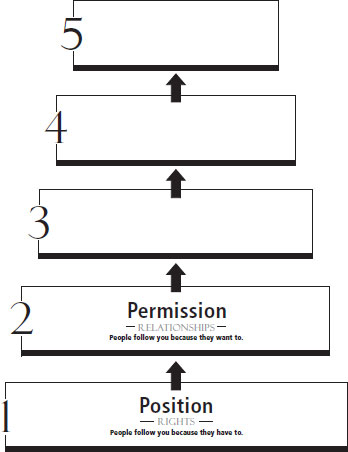



Making the shift from Position to Permission brings a person’s first real step into leadership. Why do I say that? Because leadership is influence, nothing more, nothing less. Leaders who rely on their positions to move people rarely develop influence with them. If their subordinates do what they are asked, it’s usually because they think they have to—to receive their pay, keep their jobs, prevent being reprimanded, and so on.
People go along with leaders they get along with.
In contrast, when a leader learns to function on the Permission level, everything changes. People do more than merely comply with orders. They actually start to follow. And they do so because they really want to. Why? Because the leader begins to influence people with relationship, not just position. Building relationships develops a foundation for effectively leading others. It also starts to break down organizational silos as people connect across the lines between their job descriptions or departments. The more barriers come down and relationships deepen, the broader the foundation for leading others becomes. When people feel liked, cared for, included, valued, and trusted, they begin to work together with their leader and each other. And that can change the entire working environment. The old saying is really true: people go along with leaders they get along with.
Relationships are a major key to success, whether you’re trying to sell, coach, teach, lead, or simply navigate the daily tasks of life. In the context of sales, Jeffrey Gitomer, author of The Sales Bible and Jeffrey Gitomer’s Little Red Book of Selling, uses the analogy of the rock-paper-scissors game to describe the importance of relationships.
Here’s the rock, paper, scissors game of selling:
Relationship is more powerful than price.
Relationship is more powerful than delivery.
Relationship is more powerful than quality.
Relationship is more powerful than service.
That can also be said about leading. Relationships have great power.
Moving up to Level 2 is an important development in leadership because that is where followers give their supervisors permission to lead them. People change from being subordinates to followers for the first time, and that means there is movement! Remember, leadership always means that people are going somewhere. They aren’t static. No journey, no leadership.